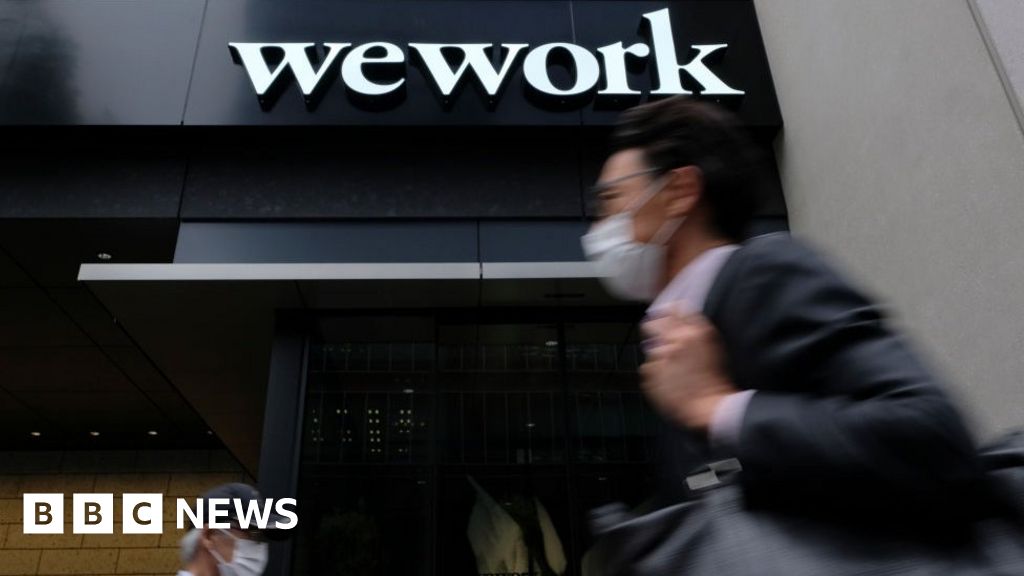WeWork Reports $2bn Loss Ahead Of Stock Market Debut

image copyrightGetty Images
Office-sharing startup WeWork has posted a $2.06bn (£1.45bn) quarterly loss after being hit hard by Covid-19.
The announcement comes as WeWork prepares for its stock market debut.
The company's first attempt to go public collapsed in 2019 over concerns about its business model and co-founder Adam Neumann's leadership style.
Since Mr Neumann's exit the company has gone through a major shakeup that has seen significant job cuts and businesses sold off.
The business felt the impact of the pandemic particularly hard as social distancing rules drove a surge in people working from home and concerns about infections saw workers avoiding shared office spaces.
WeWork, which is backed by Japanese tech giant SoftBank, said its first-quarter revenue almost halved from a year ago to $598m.
But the firm said people are now returning to its offices as coronavirus restrictions are eased.
Its occupancy rate edged up to 50% in the most recent quarter, compared to 47% in the previous three months.
The company also said it expects the change in working habits to increase demand for the kind of short-term leases it offers.
Stock market plans
In March, WeWork said it would finally see its shares start trading on the stock market, through the purchase by the publicly traded BowX Acquisition Corp.
BowX is a so-called special purpose acquisition company, a shell firm that uses proceeds from a public listing to buy a private firm.
The firm is led by the owner of the NBA's Sacramento Kings and affiliated with basketball legend Shaquille O'Neill.
The deal valued WeWork at $9bn - roughly a fifth of the its estimated worth in 2019, before its earlier flotation effort spectacularly imploded.
Investors had raised questions about the company's finances and how the business was being managed by founder Adam Neumann, who then left the firm.
After plans to list the company were shelved, WeWork restructured the business.
It closed around 100 locations, pulled out of non-core ventures - including a dog walking app and a wave pool maker - and now has just a third of the employees it did in mid-2019.
The company said it incurred restructuring costs of $494m, including its settlement with Mr Neumann. It posted an impairment charge of $299m partly due to an exit out of some real estate.
In February, WeWork's backer, SoftBank, and Mr Neumann reached a settlement to end a legal battle that started in 2019.
From Chip War To Cloud War: The Next Frontier In Global Tech Competition
The global chip war, characterized by intense competition among nations and corporations for supremacy in semiconductor ... Read more
The High Stakes Of Tech Regulation: Security Risks And Market Dynamics
The influence of tech giants in the global economy continues to grow, raising crucial questions about how to balance sec... Read more
The Tyranny Of Instagram Interiors: Why It's Time To Break Free From Algorithm-Driven Aesthetics
Instagram has become a dominant force in shaping interior design trends, offering a seemingly endless stream of inspirat... Read more
The Data Crunch In AI: Strategies For Sustainability
Exploring solutions to the imminent exhaustion of internet data for AI training.As the artificial intelligence (AI) indu... Read more
Google Abandons Four-Year Effort To Remove Cookies From Chrome Browser
After four years of dedicated effort, Google has decided to abandon its plan to remove third-party cookies from its Chro... Read more
LinkedIn Embraces AI And Gamification To Drive User Engagement And Revenue
In an effort to tackle slowing revenue growth and enhance user engagement, LinkedIn is turning to artificial intelligenc... Read more

